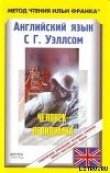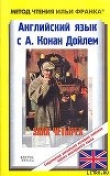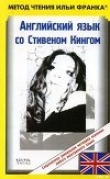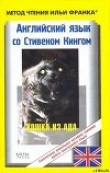
Текст книги "Английский язык с Агатой Кристи. Убийства по алфавиту"
Автор книги: Илья Франк
Соавторы: Agatha Christie,Евгения Мерзлякова
Жанры:
Языкознание
,сообщить о нарушении
Текущая страница: 12 (всего у книги 39 страниц) [доступный отрывок для чтения: 14 страниц]
We had a word with each of the other two girls (мы поговорили с остальными девушками: «с каждой из других девушек») but with no further results (но без дополнительных: «дальнейших» результатов). Betty Barnard had not said anything as to her plans (Бетти Барнард не сказала ничего относительно своих планов) and no one had noticed her in Bexhill during the course of the evening (и никто /не/ заметил ее в Бексхилле в течение вечера).
confide [kǝnˈfaɪd], sweet [swi:t], course [kɔ:s]
In the end it boiled down to this. Elizabeth Barnard had not confided in anyone in the café as to her plans for the evening, but in Miss Higley's opinion she had been going to meet her «friend.» She had had on a new white dress, «ever so sweet with one of the new necks.»
We had a word with each of the other two girls but with no further results. Betty Barnard had not said anything as to her plans and no one had noticed her in Bexhill during the course of the evening.
X. The Barnards
(/семья/ Барнардов)
Elizabeth Barnard's parents lived in a minute bungalow (родители Элизабет Барнард жили в крохотном бунгало; minute – мелкий, мельчайший), one of fifty or so (одного из пятидесяти или около того) recently run up by a speculative builder on the confines of the town (недавно спешно возведенных строителем-спекулянтом на окраине города; to run up – быстро расти; спешно возводить; confine – граница, предел).
The name of it was Llandudno[19]19
Llandudno – Лландидно (популярный приморский курорт в Уэльсе (Wales)).
[Закрыть](оно называлось Лландидно: «его имя было Лландидно»).
Mr. Barnard (мистер Барнард), a stout (плотный), bewildered-looking man of fifty-five or so (выглядящий сбитым с толку мужчина /лет/ пятидесяти пяти или около того; to bewilder – смущать, ставить в тупик), had noticed our approach (заметил наше приближение) and was standing waiting in the doorway (и стоял, ожидая в дверном проеме).
"Come in, gentlemen," he said (заходите, джентельмены).
Inspector Kelsey took the initiative (инспектор Келси взял инициативу /в свои руки/). "This is Inspector Crome of Scotland Yard, sir (это инспектор Кроум из Скотланд-Ярда, сэр)," he said. "He's come down to help us over this business (он прибыл помочь нам в этом деле)."
"Scotland Yard?" said Mr. Barnard hopefully (Скотланд-Ярд? – сказал с надеждой мистер Барнард). "That's good (это хорошо). This murdering villain's got to be laid by the heels (этот злодей-убийца должен быть закован в кандалы; to lay down/to lay by the heels – садить в тюрьму; арестовывать). My poor little girl (моя бедная маленькая девочка) —"
bewildered [bɪˈwɪldǝd], initiative [ɪˈnɪʃɪǝtɪv], villain [ˈvɪlǝn]
Elizabeth Barnard's parents lived in a minute bungalow, one of fifty or so recently run up by a speculative builder on the confines of the town.
The name of it was Llandudno.
Mr. Barnard, a stout, bewildered-looking man of fifty-five or so, had noticed our approach and was standing waiting in the doorway.
"Come in, gentlemen," he said.
Inspector Kelsey took the initiative. "This is Inspector Crome of Scotland Yard, sir," he said. "He's come down to help us over this business."
"Scotland Yard?" said Mr. Barnard hopefully. "That's good. This murdering villain's got to be laid by the heels. My poor little girl – "
His face was distorted by a spasm of grief (его лицо было искажено гримасой горя).
"And this is Mr. Hercule Poirot (а это мистер Эркюль Пуаро), also from London (также из Лондона), and er – (и э …)"
"Captain Hastings," said Poirot (капитан Гастингс).
"Pleased to meet you, gentlemen," said Mr. Barnard mechanically (приятно познакомиться с вами, джентельмены, – машинально сказал мистер Барнард). "Come into the snuggery (пройдемте в комнату; snuggery – маленький кабинет; маленькая уютная комната; snug – уютный). I don't know that my poor wife's up to seeing you (не знаю, сможет ли моя бедная жена встретиться с вами; to be up to – быть способным сделать что-либо; to see – видеть; навещать; встречаться). All broken up, she is (она вся разбита /горем/; to break up)."
However (однако), by the time (к тому времени) that we were ensconced in the living room of the bungalow (как нас усадили в гостиной бунгало; to ensconce – прятать/ся/; устраиваться), Mrs. Barnard had made her appearance (появилась миссис Барнард; to appear – появляться; appearance – появление). She had evidently been crying bitterly (она явно горько плакала; bitter – горький), her eyes were reddened (ее глаза были покрасневшими; red – красный) and she walked with the uncertain gait of a person (она шла неуверенной походкой человека; gait – походка, поступь) who had had a great shock (который пережил большое потрясение).
"Why, Mother, that's fine," said Mr. Barnard (ну, мать, все хорошо). "You're sure (ты уверена) you're all right – eh (что ты в порядке, а)?"
mechanically [mɪˈkænɪk(ǝ)lɪ], snuggery [ˈsnʌɡǝrɪ], ensconce [ɪnˈskɔns]
His face was distorted by a spasm of grief.
"And this is Mr. Hercule Poirot, also from London, and er – "
"Captain Hastings," said Poirot.
"Pleased to meet you, gentlemen," said Mr. Barnard mechanically. "Come into the snuggery. I don't know that my poor wife's up to seeing you. All broken up, she is."
However, by the time that we were ensconced in the living room of the bungalow, Mrs. Barnard had made her appearance. She had evidently been crying bitterly, her eyes were reddened and she walked with the uncertain gait of a person who had had a great shock.
"Why, Mother, that's fine," said Mr. Barnard. "You're sure you're all right – eh?"
He patted her shoulder (он похлопал ее /по/ плечу) and drew her down into a chair (и усадил ее в кресло; to draw – тащить).
"The superintendent was very kind," said Mr. Barnard (старший офицер был очень любезен). "After he'd broken the news to us (после того, как он поставил нас в известность), he said he'd leave any questions till later (он сказал, что он оставит любые вопросы на потом) when we'd got over the first shock (когда мы оправимся после первого потрясения; to get over – перейти; оправиться; преодолеть)."
"It is too cruel (это слишком жестоко). Oh, it is too cruel," cried Mrs. Barnard tearfully (о, это слишком жестоко – /со/ слезами вскричала миссис Барнард; tear – слеза). "The cruelest thing (это самая жестокая вещь) that ever was, it is (/из всех/ что когда-либо были, это)."
Her voice had a faintly sing-song intonation (ее голос имел легкую напевную интонацию) that I thought for a moment was foreign (которая, /как/ я на мгновение подумал, была иностранной) till I remembered the name on the gate (пока я /не/ вспомнил название на воротах /дома/) and realized (и /не/ осознал) that the «effer wass» of her speech was in reality proof of her Welsh origin (что это «когдааа-лллибо» в ее речи было, на самом деле, подтверждением ее валлийского происхождения).
cruel [ˈkrʋǝl], sing-song [ˈsɪŋsɔŋ], origin [ˈɔrɪʤɪn]
He patted her shoulder and drew her down into a chair.
"The superintendent was very kind," said Mr. Barnard. "After he'd broken the news to us, he said he'd leave any questions till later when we'd got over the first shock."
"It is too creel. Oh, it is too cruel," cried Mrs. Barnard tearfully. "The cruelest thing that ever was, it is."
Her voice had a faintly sing-song intonation that I thought for a moment was foreign till I remembered the name on the gate and realized that the "effer wass" of her speech was in reality proof of her Welsh origin.
"It's very painful, madam (это очень болезненно, мадам), I know," said Inspector Crome. "And we've every sympathy for you (и мы все очень вам соболезнуем: «и у нас каждое = всякое/полное сочувствие для вас»), but we want to know all the facts we can (но мы хотим знать все факты, которые мы сможем /узнать/) so as to get to work as quick as possible (так, чтобы приступить к работе как можно скорее)."
''That's sense, that is," said Mr. Barnard (это /имеет/ смысл, да), nodding approval (кивая /с/ одобрением; to approve – одобрять).
"Your daughter was twenty-three (вашей дочери было двадцать три), I understand (/как/ я понимаю). She lived here with you (она жила здесь с вами) and worked at the Ginger Cat café (и работала в кафе «Рыжий кот»), is that right (это верно)?"
"That's it (это так)."
"This is a new place, isn't it (это новое место, не так ли)? Where did you live before (где вы жили раньше)?"
"I was in the ironmongery business in Kennington (я занимался торговлей скобяными изделиями в Кеннингтоне; monger – продавец, торговец; iron – железо; тот или иной сорт железа, стали). Retired two years ago (вышел на пенсию два года назад). Always meant to live near the sea (всегда намеревался жить рядом с морем; to mean – иметь в виду, намереваться)."
ironmongery [ˈaɪǝnˌmʌŋɡ(ǝ)rɪ], approval [ǝˈpru:v(ǝ)l], daughter [ˈdɔ:tǝ]
«It's very painful, madam, I know,» said Inspector Crome. «And we've every sympathy for you, but we want to know all the facts we can so as to get to work as quick as possible.»
''That's sense, that is," said Mr. Barnard, nodding approval.
"Your daughter was twenty-three, I understand. She lived here with you and worked at the Ginger Cat café, is that right?"
"That's it."
"This is a new place, isn't it? Where did you live before?"
"I was in the ironmongery business in Kennington. Retired two years ago. Always meant to live near the sea."
"You have two daughters (у вас две дочери)?"
"Yes. My elder daughter works in an office in London in the City[20]20
The City – Сити, деловой район в Лондоне; финансовые и коммерческие круги Лондона.
[Закрыть](моя старшая дочь работает в офисе в Сити в Лондоне)."
"Weren't you alarmed (вы не встревожились; alarm – тревога) when your daughter didn't come home last night (когда ваша дочь не пришла домой прошлой ночью)?"
"We didn't know she hadn't," said Mrs. Barnard tearfully (мы не знали, что она не /пришла/, – сказала /со/ слезами миссис Барнард). "Dad and I always go to bed early (отец и я всегда рано ложимся /спать/; to go to bed). Nine o'clock's our time (девять часов – наше время). We never knew (мы даже и не узнали: «мы никогда /не/ знали») Betty hadn't come home (что Бетти не пришла домой) till the police officer came – (пока офицер полиции /не/ пришел) and said (и /не/ сказал) – and said – "
She broke down (она прервалась).
"Was your daughter in the habit of (была /ли/ у вашей дочери привычка) – er (э) – returning home late (возвращаться домой поздно)?"
alarm [ǝˈlɑ:m], police [pǝˈli:s], habit [ˈhæbɪt]
«You have two daughters?»
"Yes. My elder daughter works in an office in London in the City."
"Weren't you alarmed when your daughter didn't come home last night?"
"We didn't know she hadn't," said Mrs. Barnard tearfully. "Dad and I always go to bed early. Nine o'clock's our time. We never knew Betty hadn't come home till the police officer came and said – and said – "
She broke down.
"Was your daughter in the habit of – er – returning home late?"
"You know what girls are nowadays, inspector (вы знаете какие нынче девушки, инспектор)," said Barnard. "Independent (независимые; to depend – зависеть), that's what they are (вот они какие). These summer evenings they're not going to rush home (этими = такими летними вечерами они не собираются торопиться домой). All the same, Betty was usually in by eleven (однако Бетти обычно была дома к одиннадцати; to be in – быть внутри; быть дома)."
"How did she get in (как она попадала домой)? Was the door open (дверь была открыта)?"
"Left the key under the mat (оставляли ключ под ковриком; to leave) – that's what we always did (это то, что мы всегда делали)."
"There is some rumour (есть такой слух), I believe (я полагаю), that your daughter was engaged to be married (что ваша дочь была помолвлена, чтобы выйти замуж)?"
"They don't put it as formally as that nowadays," said Mr. Barnard (они не относятся к этому так формально в настоящее время).
key [ki:], rumour [ˈru:mǝ], engage [ɪnˈɡeɪʤ]
«You know what girls are nowadays, inspector,» said Barnard. «Independent, that's what they are. These summer evenings they're not going to rush home. All the same, Betty was usually in by eleven.»
"How did she get in? Was the door open?"
"Left the key under the mat – that's what we always did."
"There is some rumour, I believe, that your daughter was engaged to be married?"
"They don't put it as formally as that nowadays," said Mr. Barnard.
"Donald Fraser his name is (Дональд Фрейзер – его имя), and I liked him (и он мне нравился). I liked him very much," said Mrs. Barnard (мне он очень нравился). "Poor fellow (бедный парень), it'll be terrible for him (это будет ужасно для него) – this news (эта новость). Does he know yet (он уже знает), I wonder (интересно: «я задаюсь вопросом»)?"
"He works in Court & Brunskill's (он работает в «Корт-энд-Бранскилл»), I understand (/как/ я понимаю)."
"Yes, they're the estate agents (это агентство по /продаже/ недвижимости)."
"Was he in the habit of meeting your daughter most evenings after her work (была ли у него привычка встречать вашу дочь по вечерам после ее работы: «большинство вечеров после ее работы»)?"
"Not every evening (не каждый вечер). Once or twice a week would be nearer (один или два раза в неделю, скорее: «будет ближе = точнее сказать»; near – ближний; скорый)."
"Do you know if she was going to meet him yesterday (вы знаете, собиралась ли она встречаться с ним вчера)?"
agent [ˈeɪʤ(ǝ)nt], nearer [ˈnɪǝrǝ], once [wʌns]
«Donald Fraser his name is, and I liked him. I liked him very much,» said Mrs. Barnard. «Poor fellow, it'll be terrible for him – this news. Does he know yet, I wonder?»
"He works in Court & Brunskill's, I understand."
"Yes, they're the estate agents."
"Was he in the habit of meeting your daughter most evenings after her work?"
"Not every evening. Once or twice a week would be nearer."
"She didn't say (она не сказала). Betty never said much about (Бетти никогда много /не/ говорила о /том/) what she was doing (что она делала) or where she was going (или куда она шла). But she was a good girl (но она была хорошей девочкой), Betty was (/наша/ Бетти). Oh, I can't believe (о, я не могу поверить) – "
Mrs. Barnard started sobbing again (миссис Барнард начала снова всхлипывать).
"Pull yourself together, old lady (соберись, жена: «стяни себя вместе, старая женщина»; old lady – разг. мать; жена). Try to hold up, Mother," urged her husband (постарайся держаться, мать, – убеждал ее муж; to hold up – подпирать, поддерживать; to urge – подгонять; убеждать; надоедать). "We've got to get to the bottom of this (мы должны добраться до сути этого; bottom – низ; суть, сущность)."
sob [sɔb], hold [hǝʋld], bottom [ˈbɔtǝm]
«Do you know if she was going to meet him yesterday?»
"She didn't say. Betty never said much about what she was doing or where she was going. But she was a good girl, Betty was. Oh, I can't believe – "
Mrs. Barnard started sobbing again.
"Pull yourself together, old lady. Try to hold up, Mother," urged her husband. "We' we got to get to the bottom of this …"
"I'm sure (я уверена) Donald would never (что Дональд никогда бы) – would never – " sobbed Mrs. Barnard (никогда бы, – всхлипнула миссис Барнард).
"Now just you pull yourself together," repeated Mr. Barnard (ну-ка, просто соберись, – повторил мистер Барнард).
He turned to the two inspectors (он повернулся к двум инспекторам). "I wish to God (я молю Бога: «я желаю Богу») I could give you some help (чтобы я смог бы вам оказать какую-нибудь помощь) – but the plain fact is I know nothing (но простой факт /в том, что/ я ничего /не/ знаю) – nothing at all (совсем ничего) that can help you to the dastardly scoundrel (что может помочь вам с этим подлым негодяем; dastard – трус; негодяй; scoundrel – негодяй, мерзавец, подлец) who did this (кто сделал это). Betty was just a merry, happy girl (Бетти была просто веселой, счастливой девушкой) – with a decent young fellow that she was (с достойным молодым человеком, /с/ которым она) – well, we'd have called it walking out with in my young days (мы называли это «выходить погулять» в дни моей молодости: «в мои молодые дни»). Why anyone should want to murder her simply beats me (/то/, зачем кому-то хотеть убить ее, просто поражает меня; to beat – бить) – it doesn't make sense (это не имеет смысла)."
scoundrel [ˈskaʋndr(ǝ)l], dastardly [ˈdæstǝdlɪ], decent [ˈdi:sǝnt]
«I'm sure Donald would never – would never —» sobbed Mrs. Barnard.
"Now just you pull yourself together," repeated Mr. Barnard.
He turned to the two inspectors. "I wish to God I could give you some help – but the plain fact is I know nothing – nothing at all that can help you to the dastardly scoundrel who did this. Betty was just a merry, happy girl – with a decent young fellow that she was – well, we'd have called it walking out with in my young days. Why anyone should want to murder her simply beats me – it doesn't make sense."
«You're very near the truth there, Mr. Barnard,» said Crome (вы тут очень близки к правде, мистер Барнард). "I tell you what I'd like to do (я скажу вам, что бы мне хотелось сделать) – have a look over Miss Barnard's room (взглянуть на комнату мисс Барнард). There may be something (там может быть что-то) – letters (письма) – or a diary (или дневник)."
"Look over it and welcome," said Mr. Barnard (осмотрите ее и милости просим), rising (поднимаясь).
He led the way (он показал дорогу; to lead – вести). Crome followed him (Кроум последовал за ним), then Poirot (затем Пуаро), then Kelsey, and I brought up the rear (а я замыкал шествие; rear – тыл; задняя сторона).
I stopped for a minute to retie my shoelace (я остановился на минуту, чтобы снова завязать шнурок ботинка; to tie – завязывать), and as I did so (и пока я это делал), a taxi drew up outside (такси подъехало снаружи) and a girl jumped out of it (и девушка выпрыгнула из него). She paid the driver (она заплатила водителю) and hurried up the path to the house (и заторопилась по дорожке к дому), carrying a small suitcase (неся маленький чемодан). As she entered the door (когда она зашла в дверь) she saw me (она увидела меня) and stopped dead (и остановилась как вкопанная: «и остановилась намертво»).
diary [ˈdaɪǝrɪ], rear [rɪǝ], shoelace [ˈʃu:leɪs]
«You're very near the truth there, Mr. Barnard,» said Crome. «I tell you what I'd like to do – have a look over Miss Barnard's room. There may be something – letters – or a diary.»
"Look over it and welcome," said Mr. Barnard, rising.
He led the way. Crome followed him, then Poirot, then Kelsey, and I brought up the rear.
I stopped for a minute to retie my shoelace, and as I did so, a taxi drew up outside and a girl jumped out of it. She paid the driver and hurried up the path to the house, carrying a small suitcase. As she entered the door she saw me and stopped dead.
There was something so arresting in her pose (было что-то, приковывающее /внимание/ в ее позе; arrest – арест; задержание) that it intrigued me (что это заинтриговало меня).
"Who are you (кто вы)?" she said.
I came down a few steps (я спустился на несколько ступенек). I felt embarrassed (я чувствовал смущение) as to how exactly to reply (насчет того, как точно ответить). Should I give my name (следует ли мне назвать мою фамилию)? Or mention (или упомянуть) that I had come here with the police (что я пришел сюда с полицией)? The girl, however, gave me no time to make a decision (девушка, однако, /не/ дала мне нисколько времени принять решение; to decide – решать).
"Oh, well," she said, "I can guess (я могу догадаться)."
She pulled off the little white woollen cap (она стянула маленькую белую шерстяную шапочку) she was wearing (/которая/ была на ней надета: «/которую/ она носила») and threw it on the ground (и бросила ее на землю; to throw). I could see her better now (теперь я мог видеть ее лучше) as she turned a little (когда она повернулась слегка) so that the light fell on her (так, что свет падал на нее).
intrigue n. [ˈɪntri:ɡ] intrigue v. [ɪnˈtri:ɡ], woollen [ˈwʋlǝn], decision [dɪˈsɪʒn]
There was something so arresting in her pose that it intrigued me.
"Who are you?" she said.
I came down a few steps. I felt embarrassed as to how exactly to reply. Should I give my name? Or mention that I had come here with the police? The girl, however, gave me no time to make a decision.
"Oh, well," she said, "I can guess."
She pulled off the little white woollen cap she was wearing and threw it on the ground. I could see her better now as she turned a little so that the light fell on her.
My first impression was of the Dutch dolls (первое впечатление, /которое у меня сложилось/, было о голландских куклах) that my sisters used to play with (с которыми, бывало, играли мои сестры) in my childhood (когда я был ребенком: «в моем детстве»). Her hair was black (ее волосы были черными) and cut in a straight bob (и подстриженными прямой круглой стрижкой; to cut – резать; стричь; bob – короткая круглая стрижка /у женщин/) and a bang across the forehead (и с челкой через /весь/ лоб). Her cheekbones were high (ее скулы были высокие) and her whole figure had a queer modern angularity (и вся ее фигура имела своеобразную современную угловатость; queer – странный; необычный; angle – угол) that was not (которая не была), somehow (каким-то образом), unattractive (непривлекательной; to attract – привлекать). She was not good-looking (она не была хорошенькой) – plain rather (скорее, некрасивой; plain – уст. плоский, ровный; незамысловатый, обыкновенный; некрасивый) – but there was an intensity about her (но в ней была напряженность; intense – крепкий, сильный; интенсивный), a forcefulness (сила; force – сила) that made her a person quite impossible to overlook (которая делала ее личностью, на которую совершенно невозможно было не обратить внимание; to overlook – не заметить, просмотреть, пропустить).
"You are Miss Barnard?" I asked (вы мисс Барнард?).
"I am Megan Barnard (я Меган Барнард). You belong to the police (вы из полиции: «вы принадлежите полиции»), I suppose (я полагаю; to suppose – предполагать)."
"Well," I said, "not exactly (не совсем; exactly – точно) – – "
She interrupted me (она прервала меня). "I don't think (я не думаю) I've got anything to say to you (что мне есть, что вам сказать). My sister was a nice bright girl with no men friends (моя сестра была милой, умной девушкой без друзей-мужчин; bright – яркий; ясный; умный). Good morning (доброго /вам/ утра)."
cheekbones [ˈtʃi:kbǝʋn], angularity [ˌæŋɡju:ˈlærɪtɪ], intensity [ɪnˈtensɪtɪ]
My first impression was of the Dutch dolls that my sisters used to play with in my childhood. Her hair was black and cut in a straight bob and a bang across the forehead. Her cheekbones were high and her whole figure had a queer modern angularity that was not, somehow, unattractive. She was not good-looking – plain rather – but there was an intensity about her, a forcefulness that made her a person quite impossible to overlook.
"You are Miss Barnard?" I asked.
"I am Megan Barnard. You belong to the police, I suppose."
"Well," I said, "not exactly – "
She interrupted me. "I don't think I've got anything to say to you. My sister was a nice bright girl with no men friends. Good morning."
She gave a short laugh (она коротко засмеялась: «она издала короткий смешок»; to give a laugh) as she spoke (когда сказала /это/) and regarded me challengingly (и посмотрела на меня с вызовом). "That's the correct phrase, I believe (это правильная фраза, я полагаю)?" she said.
"I'm not a reporter (я не репортер), if that's what you're getting at (если это то, на что вы намекаете)."
"Well, what are you (а кто вы /по профессии/)?" She looked round (она посмотрела вокруг). "Where's mum and dad (где мама и папа)?"
"Your father is showing the police your sister's bedroom (ваш отец показывает полиции спальню вашей сестры). Your mother's in there (ваша мать там внутри). She's very upset (она очень расстроена)."
The girl seemed to make a decision (девушка, казалось, приняла решение).
"Come in here (заходите сюда)," she said.
She pulled open a door (она толкнула /и/ открыла дверь) and passed through (и прошла через /нее/). I followed her (я последовал за ней) and found myself in a small, neat kitchen (и оказался в маленькой: «обнаружил себя в маленькой», чистой кухне).
mum [mʌm], upset [ʌpˈset], neat [ni:t]
She gave a short laugh as she spoke and regarded me challengingly. «That's the correct phrase, I believe?» she said.
"I'm not a reporter, if that's what you're getting at."
"Well, what are you?" She looked round. "Where's mum and dad?"
"Your father is showing the police your sister's bedroom. Your mother's in there. She's very upset."
The girl seemed to make a decision.
"Come in here," she said.
She pulled open a door and passed through. I followed her and found myself in a small, neat kitchen.
I was about to shut the door behind me (я собирался закрыть дверь за собой) – but found an unexpected resistance (но обнаружил неожиданное сопротивление; to resist – сопротивляться). The next moment Poirot had slipped quietly into the room (в следующую минуту Пуаро тихо проскользнул в комнату) and shut the door behind him (и закрыл дверь за собой; to shut – закрывать; захлопывать).
"Mademoiselle Barnard?" he said with a quick bow (мадемуазель Барнард? – сказал он, быстро поклонившись: «с быстрым поклоном»).
"This is M. Hercule Poirot," I said (это мсье Эркюль Пуаро).
Megan Barnard gave him a quick (Меган Барнард бросила на него быстрый), appraising glance (оценивающий взгляд; to appraise – оценивать, расценивать).
"I've heard of you," she said (я слышала о вас). "You're the fashionable private sleuth, aren't you (вы модная частная ищейка, не так ли; sleuth —ищейка, сыщик, шпион)?"
"Not a pretty description (не /особенно/ приятное описание) – but it suffices," said Poirot (но достаточное: «оно удовлетворительное»; to suffice – быть достаточным, хватать; удовлетворять).
mademoiselle [ˌmædǝm(w)ǝˈzel], sleuth [slu:Ɵ], suffice [sǝˈfaɪs]
I was about to shut the door behind me – but found an unexpected resistance. The next moment Poirot had slipped quietly into the room and shut the door behind him.
"Mademoiselle Barnard?" he said with a quick bow.
"This is M. Hercule Poirot," I said.
Megan Barnard gave him a quick, appraising glance.
"I've heard of you," she said. "You're the fashionable private sleuth, aren't you?"
"Not a pretty description – but it suffices," said Poirot.
The girl sat down on the edge of the kitchen table (девушка присела на край кухонного стола; to sit down). She felt in her bag for a cigarette (она нащупала в сумке сигарету). She placed it between her lips (она расположила ее между губ), lighted it (зажгла ее; to light), and then said in between two puffs of smoke (и затем проговорила между двум клубами дыма): "Somehow (как-то), I don't see (я не понимаю) what M. Hercule Poirot is doing in our humble little crime (что мсье Эркюль Пуаро делает в нашем скромном маленьком преступлении; humble – смиренный; скромный, непритязательный)."
"Mademoiselle," said Poirot (мадемуазель), "what you do not see (/то/, чего не понимаете вы) and what I do not see would probably fill a volume (и чего не понимаю я, вероятно, заполнит том; volume – объем; том, книга). But all that is of no practical importance (но все это не имеет практического значения; important – важный, значимый). What is of practical importance is something (а /вот/ что имеет практическое значение, это /как раз/ нечто) that will not be easy to find (что будет нелегко найти)."
"What's that (что это)?"
humble [hʌmbl], volume [ˈvɔljum], puff [pʌf]
The girl sat down on the edge of the kitchen table. She felt in her bag for a cigarette. She placed it between her lips, lighted it, and then said in between two puffs of smoke: «Somehow, I don't see what M. Hercule Poirot is doing in our humble little crime.»
"Mademoiselle," said Poirot, «what you do not see and what I do not see would probably fill a volume. But all that is of no practical importance. What is of practical importance is something that will not be easy to find.»
"What's that?"
"Death, mademoiselle(смерть, мадемуазель), unfortunately creates a prejudice (к сожалению, создает предубеждение). A prejudice in favour of the deceased (предубеждение в пользу покойного). I heard what you said just now to my friend Hastings (я слышал, что вы сказали прямо сейчас моему другу Гастингсу). 'A nice bright girl with no men friends (милая, умная девушка без друзей-мужчин).' You said that in mockery of the newspapers (вы сказали это в насмешку газетам; to mock – насмехаться; издеваться), And it is very true (и это настоящая правда) – when a young girl is dead (когда молодая девушка мертва), that is the kind of thing that is said (это то, что обычно говорят: «это тип вещи, который говорят»). She was bright (она была умной). She was happy (она была счастливой). She was sweet-tempered (у нее был славный характер). She had not a care in the world (у нее не было никаких забот: «забот в мире»). She had no undesirable acquaintances (у нее не было нежелательных знакомств; to desire – желать).
There is a great charity always to the dead (это всегда большая милость к умершим; charity – милость; благотворительность). Do you know what I should like this minute (вы знаете, чего бы мне хотелась в данную минуту)? I should like to find someone who knew Elizabeth Barnard (я хотел бы найти кого-нибудь, кто знал Элизабет Барнард) and who does not know she is dead (и кто не знает, что она мертва). Then, perhaps (тогда, возможно), I should hear what is useful to me (я услышу /то/, что полезно для меня) – the truth (правду)."
Megan Barnard looked at him for a few minutes in silence (Меган Барнард смотрела на него несколько минут в молчании) whilst she smoked (пока она курила). Then, at last, she spoke (затем, в конце концов, она заговорила). Her words made me jump (ее слова заставили меня подскочить).
"Betty," she said, "was an unmitigated little ass (была полной дурой: «была абсолютным маленьким ослом»; unmitigated – несмягченный; абсолютный, явный; to mitigate – уменьшать, ослабевать)!"
charity [ˈtʃærɪtɪ], prejudice [ˈpreʤʋdɪs], unmitigated [ʌnˈmɪtɪɡeɪtɪd]
"Death, mademoiselle, unfortunately creates a prejudice. A prejudice in favour of the deceased. I heard what you said just now to my friend Hastings. 'A nice bright girl with no men friends.' You said that in mockery of the newspapers, And it is very true – when a young girl is dead, that is the kind of thing that is said. She was bright. She was happy. She was sweet-tempered. She had not a care in the world. She had no undesirable acquaintances.







